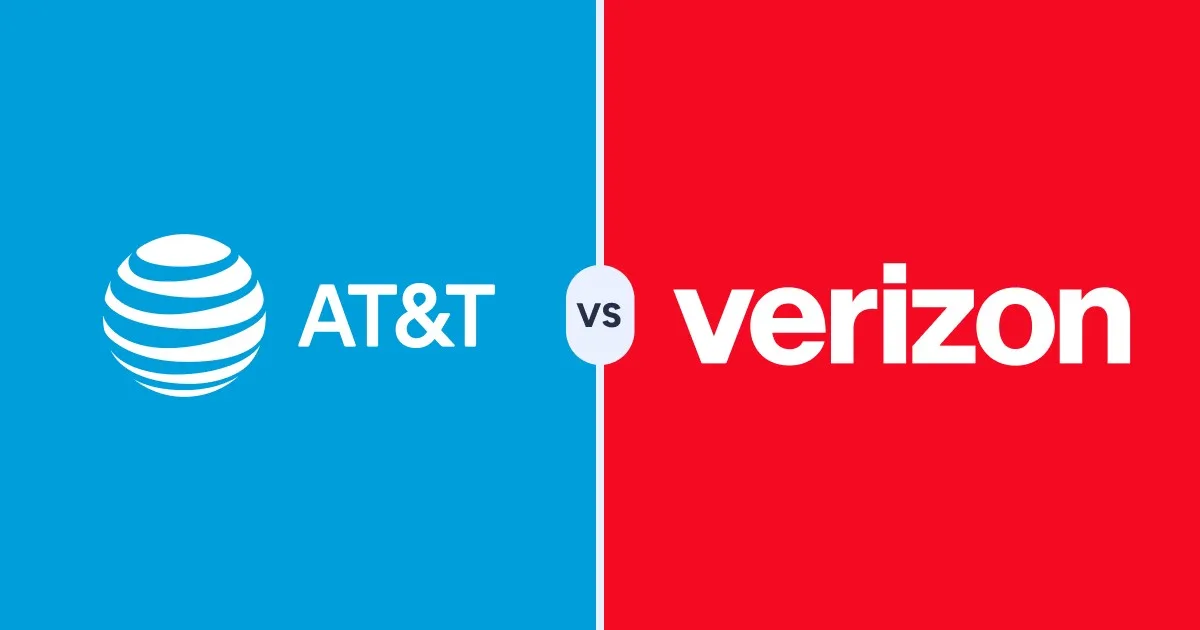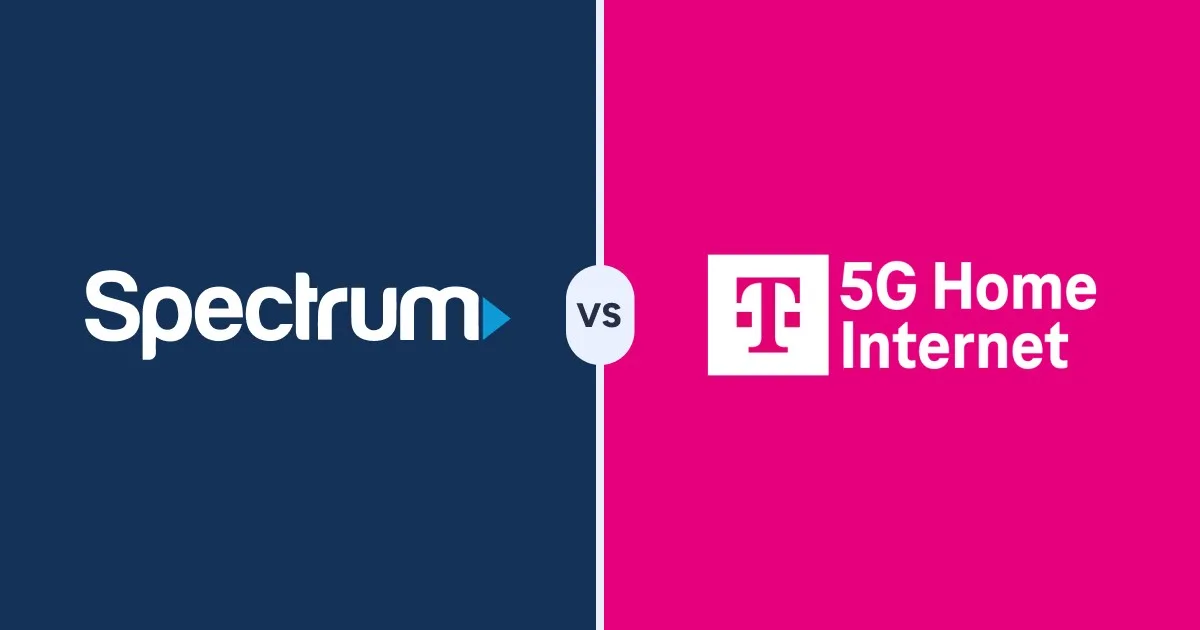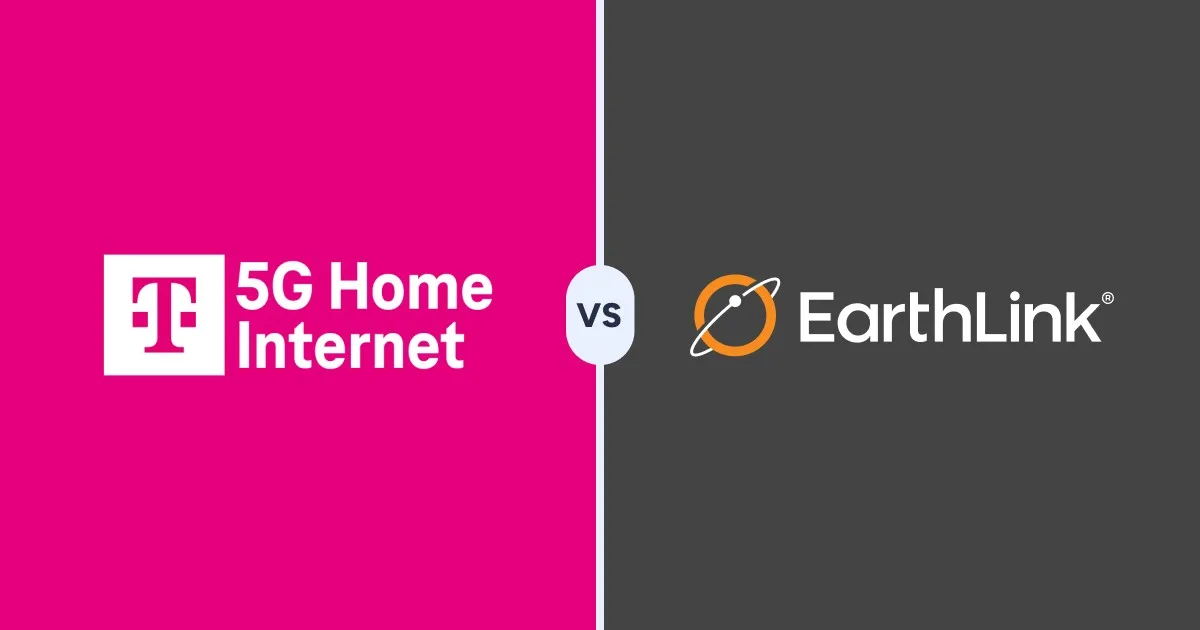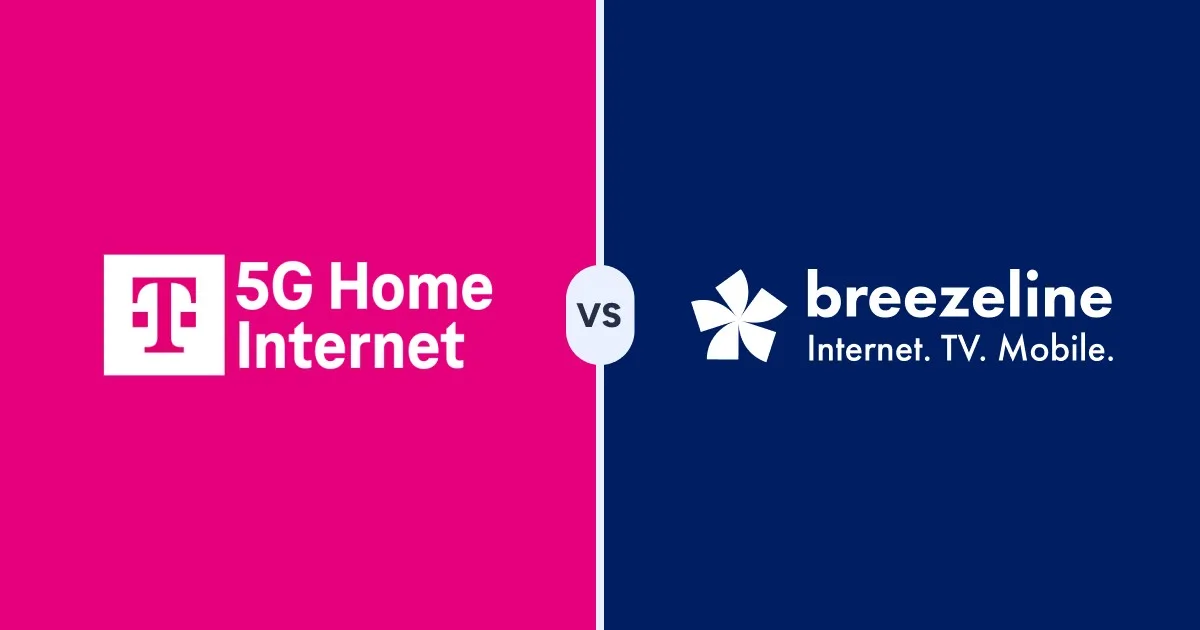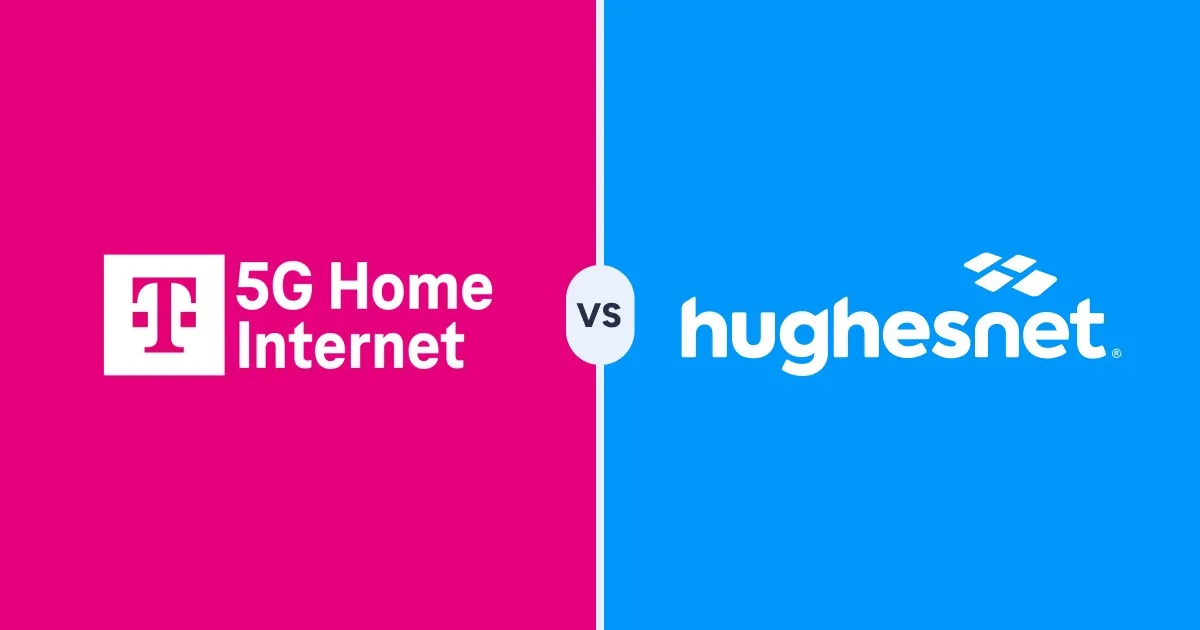Frontier vs. T-Mobile: Which Is Best for You?
Frontier’s fiber is faster, but T-Mobile’s convenience resonates better with customers
Feb 11, 2026 | Share
Provider Comparisons (Versus)
-
Best for speed
- Price: $29.99–$199.99/mo.*
- Speed: Up to 7,000Mbps
- Internet type: Fiber and DSL
- Data cap: None
- Contracts: None‡
-
Best for convenience
- Price: $50–$70/mo.†
w/ AutoPay, plus taxes & fees. - Speed: Up to 498Mbps
- Internet type: 5G fixed-wireless
- Data cap: None
- Contracts: None
- Price: $50–$70/mo.†
† Guarantee exclusions like taxes and fees apply.
‡ Frontier gift card and other rewards are subject to a term.
Compare Frontier and T-Mobile head-to-head
The choice between Frontier and T-Mobile 5G Home Internet boils down to how much internet speed you need. Frontier’s speeds are top-notch, and its fiber internet connections come with increased performance compared to the competition, but its policies can be a bit tricky to navigate.
On the other hand, just about everything is easier with T-Mobile. Its one-size-fits-all approach takes a lot of the headache out of purchasing, installing, and using a new internet service. T-Mobile offers three plans, so you have a few options for your needs. If it is available in your area, we recommend going with T-Mobile for the added convenience.
Want to know if Frontier or T-Mobile are in your area?
Enter your zip code below to see if Frontier’s fiber or T-Mobile’s 5G home internet service is available where you live.
On this page:
Plans and pricing | Extra fees | Customer ratings | Bundles | Internet connection types | Data caps | Contracts | Installation | Availability
On this page:
Plans and pricing: Frontier vs. T-Mobile
In general, you get faster speeds with Frontier. Most of its fiber internet plans offer at least double T-Mobile’s speeds—and with some, you’ll even score a cheaper rate. Along with speed and cheap rates come the perks and reliability of fiber internet. But Frontier isn’t perfect; rates typically increase after 12 months, and there are some unexpected annoyances in the fine print. That said, if top speeds are your top priority, a Frontier fiber plan is the better choice. This is all assuming you have access to Frontier’s fiber network; DSL internet, including Frontier’s, isn’t capable of meeting modern internet needs.
T-Mobile takes a unique, but efficient, approach to internet service. T-Mobile offers five plan options, but the speeds are perfect for the average customer, it’s affordably priced, and its simplicity means you won’t waste time agonizing over the technical details. And 5G home internet comes with its own unique set of perks, like an extremely easy setup without any cables, technicians, or appointments. It’s hands-down the simplest way to get up and running with a new internet service.
Frontier plans and pricing
| Package | Price | Speed |
|---|---|---|
| Frontier Internet | $64.99/mo.* | Call for details |
| Fiber 200 | $29.99/mo.¶ w/ Auto Pay and Paperless Bill | 200Mbps |
| Fiber 500 | $44.99/mo.† w/ Auto Pay and Paperless Bill | 500Mbps |
| Fiber 1 Gig | $64.99/mo.‡ w/ Auto Pay and Paperless Bill | 1,000Mbps |
| Fiber 2 Gig | $99.99/mo.§ w/ Auto Pay and Paperless Bill | 2,000Mbps |
| Fiber 5 Gig | $129.99/mo.|| w/ Auto Pay and Paperless Bill | 5,000Mbps |
| Fiber 7 Gig | $199.99/mo.** w/ Auto Pay and Paperless Bill | 7,000Mbps |
* w/ Auto Pay & Paperless Bill per month for 24 mos. One-time charge on disconnect applies.
¶ w/ Auto Pay & Paperless Bill. Max wired speed 200/200 Mbps. Wi-Fi, actual & average speeds vary. One-time charges apply.
† w/ Auto Pay & Paperless Bill. Max wired speed 500/500 Mbps. Wi-Fi, actual & average speeds vary. One-time charges apply.
‡ w/ Auto Pay & Paperless Bill. Max wired speed 1000/1000 Mbps. Location dependent. Wi-Fi, actual & average speeds vary. One-time charges apply.
§ w/ Auto Pay & Paperless Bill. Max wired speed 2000/2000 Mbps. Wi-Fi, actual & average speeds vary. One-time charges apply.
|| w/ Auto Pay & Paperless Bill. Max wired speed 5000/5000. Wi-Fi, actual & average speeds vary. One-time charges apply.
** w/ Auto Pay & Paperless Bill. Max wired speed 7000/7000. Wi-Fi, actual & average speeds vary. One-time charges apply.
Frontier has some incredibly fast plans. We think the Fiber 500 plan is best overall. You get 500Mbps of symmetrical internet speed for less than $50 per month. That’s enough speed to run five simultaneous 4K video streams and still have half of your bandwidth to support other tasks. Most Frontier internet plans also come with symmetrical internet speed (which means your upload speeds are equally as fast as your download speeds) and the increased reliability of fiber internet’s more elegant infrastructure.
On a lower note, Frontier’s price hikes are a major downside. For example, the Fiber 200 plan seems like a great pick for the budget-conscious, but its price doubles after only six months. Some Frontier rates are only guaranteed for a set amount of time, often for 12 months. This makes things even more difficult, as you don’t know how much the price will increase; hopefully not as drastically as the Fiber 200 plan!
T-Mobile plans and pricing
| Package | Price | Speed |
|---|---|---|
| Rely Home Internet | $50/mo.* w/ AutoPay, plus taxes & fees. | Up to 318Mbps |
| Amplified Home Internet | $60/mo.* w/ AutoPay, plus taxes & fees. | Up to 498Mbps |
| All-In Home Internet | $70/mo.* w/ AutoPay, plus taxes & fees. | Up to 498Mbps |
* Guarantee exclusions like taxes and fees apply.
T-Mobile’s plan options are the shortest path to simple but great internet service. T-Mobile 5G Home Internet uses a fully wireless 5G signal from cell towers, so it can be installed by the customer in about 15 minutes: no cables, no appointments, and no hassle.
While T-Mobile isn’t as fast as Frontier, its speeds are nothing to scoff at. With bandwidth up to 498Mbps, T-Mobile is more than capable of handling average internet needs; However, it’s worth noting you can only expect T-Mobile’s max speeds in areas with decent 5G reception. You’ll get a Wi-Fi 7 Gateway with the Amplified and All-In plans, giving you an equipment upgrade to reach faster speeds.
When it comes to internet speed, you only need enough to cover your online activities and a little extra headroom for bandwidth-heavy days. Any more than that is a waste; you don’t receive any benefit for purchasing more internet speed than you need.

Deals and promotions: Frontier vs. T-Mobile
- Try Unbreakable Wi-Fi backup internet free for one month, then pay just $25/mo.
- New customers can get six months of 1 Gig fiber internet on Verizon if they bundle with Verizon Wireless and live in a Frontier Fiber area
- Get free installation with any new Frontier fiber internet plan

- Get up to $300 back when you sign up for a new T-Mobile 5G Home Internet plan up by April 1
- Get a 5-Year Price Guarantee with any T-Mobile 5G Home Internet plan and some T-Mobile Fiber plans, not including taxes and fees
- Get $10 off your monthly bill for T-Mobile Fiber 1 GIG or 2 GIG with any T-Mobile voice line
Extra fees: Frontier vs. T-Mobile
T-Mobile’s no-nonsense approach to internet service means very few unexpected fees, with the only ones being a one-time activation fee and state-dependent late fees.
Frontier offers free internet equipment, but that’s where the good news ends. While the fiber installation is free, you get charged for it retroactively if you cancel your plan in the first 12 months. Frontier also employs a restocking fee, a very rare practice for internet service providers (ISPs); you’re charged $50 for simply canceling your plan any time after the first 30 days. There’s also the more common no AutoPay, paper bill, and late fees.
Customer ratings: Frontier vs. T-Mobile
T-Mobile customers gave much higher ratings than Frontier customers in our annual customer satisfaction survey. In fact, T-Mobile scored some of the highest ratings we’ve ever seen from a national internet provider, with exceptional feedback for price and overall satisfaction.
Frontier received consistently fair-to-low ratings, but we think this may be primarily due to its DSL service. When we separated Frontier’s DSL customer feedback from its fiber customer feedback, its overall average ratings improved. With that in mind, our Frontier recommendations come with the caveat that your home falls uses its fiber connection anyway.
Internet types: Frontier vs. T-Mobile
| Internet type | View on provider site | |
|---|---|---|
|
| Fiber, DSL | View Plans for Frontier |

| 5G fixed-wireless | View Plans for T-Mobile Home Internet |
Frontier’s fiber internet is the best type of internet connection you can get. Aside from more bandwidth, lower latency, and increased reliability compared to all other internet types, fiber internet is the only internet type with symmetrical speeds, which means exponentially faster upload speeds.
T-Mobile offers fixed-wireless internet, which runs on the same technology that delivers internet signal to your cell phone. This is how T-Mobile can offer internet service without installing any cables in customers’ homes.
In general, we think both of these internet types will work well for most customers. That being said, if you have particularly heavy bandwidth needs, or are looking for the lowest possible latency for online gaming or video calls, we recommend you choose Frontier’s fiber internet over 5G fixed-wireless. On the other hand, if you just want the breeziest experience possible, T-Mobile should be your pick.
Data caps: Frontier vs. T-Mobile
| Provider | Data Cap | View on provider site |
|---|---|---|
|
| None | View Plans for Frontier |

| None | View Plans for T-Mobile Home Internet |
Neither T-Mobile nor Frontier imposes data caps. Feel free to stream, game, download, and surf away without a second wasted worrying about how much data you’re using.
Contracts: Frontier vs. T-Mobile
| Provider | Contract length | View on provider site |
|---|---|---|
|
| None (with caveats) | View Plans for Frontier |

| None | View Plans for T-Mobile Home Internet |
T-Mobile doesn’t impose a term contract. You can cancel anytime without any penalties, plain and simple. Even better, your rate is guaranteed indefinitely.
Frontier’s policies are a little more tricky. Sure, there’s technically no term contract, but Frontier will charge you a prorated portion of the hefty $100 installation fee if you cancel before 12 months is up. Additionally, you’ll pay a $50 restocking fee regardless of when you cancel.
Installation: Frontier vs. T-Mobile
| Provider | Installation options | View on provider site |
|---|---|---|
|
| View Plans for Frontier | |

| View Plans for T-Mobile Home Internet |
T-Mobile has the easiest internet installation process in the business. All you need is your T-Mobile gateway and smartphone with the T-Mobile Internet app. The app will even help you find the best spot in your home to place the gateway. The whole process takes about 15 minutes, with no cables or inconvenient installation appointments.
Frontier’s fiber internet installation is free (unless you cancel your contract after the first 30 days and before the first 12 months of service). The installation itself may or may not require a technician.
Availability: Frontier vs. T-Mobile
According to the FCC, Frontier coverage is available to roughly 5% of U.S. households, and about 3% of that coverage represents fiber internet connections. Frontier’s coverage is scattered throughout the continental U.S. with dense pockets in southern California, Connecticut, New York, the Midwest, and Texas.
T-Mobile’s 5G home internet uses its massive nationwide cellular network. You can get it in most heavily populated areas.
Use our zip search below to see if either service is available in your area.
Ready to get Frontier or T-Mobile? Let’s go!
Enter your zip code below to see if one of these providers is available to you.
Final call: Frontier vs. T-Mobile
If you need more than 498Mbps speeds, Frontier is the obvious choice, provided you have access to its fiber plans. You also may appreciate Frontier’s fiber more if you’re a remote worker, content creator, or anyone that relies heavily on stable internet service. You’ll get your fast speeds, a fancy fiber connection, and a great introductory rate. But as we covered, you’ll also encounter a few uncommon fees, and, eventually, your rates will go up.
If you have average internet needs, such as streaming and surfing the web, and a household with four or fewer people, we say give T-Mobile a shot. The speeds are perfectly adequate, and you bypass a lot of the usual ISP annoyances like expensive installations and term contracts. Additionally, you’ll be up and running a lot faster with T-Mobile’s seamless onboarding experience.
Methodology
Our HighSpeedInternet.com editorial team bases our analyses on customer input from our annual customer satisfaction survey, results from our speed test tool, and proprietary internet provider data on speeds and pricing. To strengthen our research, we look closely at provider contracts to get hard-to-find information on price hikes, data caps, and extra fees, and we keep tabs on the latest news reports and online reviews. When applicable, we also rely on our personal experiences testing these services.
More about T-Mobile and Frontier
Frontier Deal Disclaimer
*For Frontier internet customers new to YouTube TV. This YouTube TV discount is only open to participants in the United States who have activated the offer from Frontier on or after October 1.
Promotional offer only available to users who are not current YouTube TV subscribers, have not been YouTube TV subscribers or participated in a YouTube TV trial before. If eligible: Frontier Internet customers will receive the standard free trial, and then a discount of $10 per month for 12 months on the standard subscription price; or Frontier Internet with current Frontier TV or Fiber TV will receive the standard free trial, and then a discount of $15 per month for 12 months on the standard subscription price offered by YouTube TV. Standard subscription price is subject to change. You will not be charged until the trial period expires. You can cancel your standard trial at no charge at any time before the trial is over. You can also cancel your YouTube TV paid membership at any time. You will continue to receive access to YouTube TV until the end of your YouTube TV billing period, but refunds and credits are not issued for partial billing periods.
Offer valid for one redemption of YouTube TV discount per eligible Frontier account. Eligible participants must use the activation link provided by Frontier and complete activation through Google to claim offer. Offer requires a Google account. Promotional value of offer is non-transferable, not for resale, non-redeemable for cash, and non-refundable. Must be 18 years or older. Free trial, offers, or promotional offers available only for YouTube TV Base Plan. Equipment, installation and other service charges, taxes and fees extra. Frontier Internet account required. Offer and billing subject to Frontier Terms and Conditions. Frontier reserves the right to change or cancel the offer at any time and for any reason. YouTube Paid Service Terms of Service also apply.
T-Mobile Deal Disclaimer
** $150 Back: Limited-time offer; subject to change. Register code within 30 days of activating new unlimited Home Internet line. If you have canceled Internet lines in the past 90 days, you may need to reactivate them first. $150 via virtual prepaid Mastercard; requires 60 days service before validation; use online or in-store via accepted mobile payment apps; no cash access & expires in 6 months. The Virtual Prepaid Mastercard is issued by Sunrise Banks N.A., Member FDIC, pursuant to a license from Mastercard International Incorporated. Mastercard is a registered trademark, and the circles design is a trademark of Mastercard International Incorporated. This card may be used everywhere Debit Mastercard is accepted. Registration, activation, acceptance, or use of this card constitutes acceptance of the terms and conditions stated in the Prepaid Card Agreement. This promotion is not associated, sponsored, or endorsed by Mastercard or Sunrise Banks N.A. Allow 1 week from fulfillment of offer requirements. Lines must be active and in good standing when card is issued. Max 1/account. May not be combined with some offers or discounts. Home Internet General Terms: During congestion, Home Internet customers may notice speeds lower than other customers due to data prioritization. Not available in all areas. $35 device connection charge due at sale. Plus taxes & fees for accounts currently paying for a T-Mobile wireless line with additional taxes & fees: Monthly Regulatory Programs (RPF) & Telco Recovery Fee (TRF) totaling $1.40 per data only line ($0.12 for RPF & $1.28 for TRF) apply; taxes/fees approx. 3-12% of bill. Credit approval required. For use only with T-Mobile Gateway for in-home use at location provided at activation. If canceling service, return gateway or pay up to $370. Video streaming resolution depends on available speeds. For best performance, leave video streaming applications at their default resolution setting. Not compatible with some live TV streaming services. AutoPay Pricing for lines 1-8 on account. Without AutoPay, $5 more. May not be reflected on 1st bill. Coverage not available in some areas. Network Management: Service may be slowed, suspended, terminated, or restricted for misuse, abnormal use, interference with our network or ability to provide quality service to other users. See T- Mobile.com/OpenInternet for details. See Terms and Conditions (including arbitration provision) at www.T-Mobile.com for additional information.”
Author - Austin Aguirre
Austin worked as a broadband technician installing and troubleshooting countless home internet networks for some of the largest ISPs in the U.S. He became a freelance writer in 2020 specializing in software guides. After graduating with a BS in technical communication from Arizona State University, he joined the team at HighSpeedInternet.com where he focuses on home network improvement and troubleshooting.
Editor - Jessica Brooksby
Jessica loves bringing her passion for the written word and her love of tech into one space at HighSpeedInternet.com. She works with the team’s writers to revise strong, user-focused content so every reader can find the tech that works for them. Jessica has a bachelor’s degree in English from Utah Valley University and seven years of creative and editorial experience. Outside of work, she spends her time gaming, reading, painting, and buying an excessive amount of Legend of Zelda merchandise.
